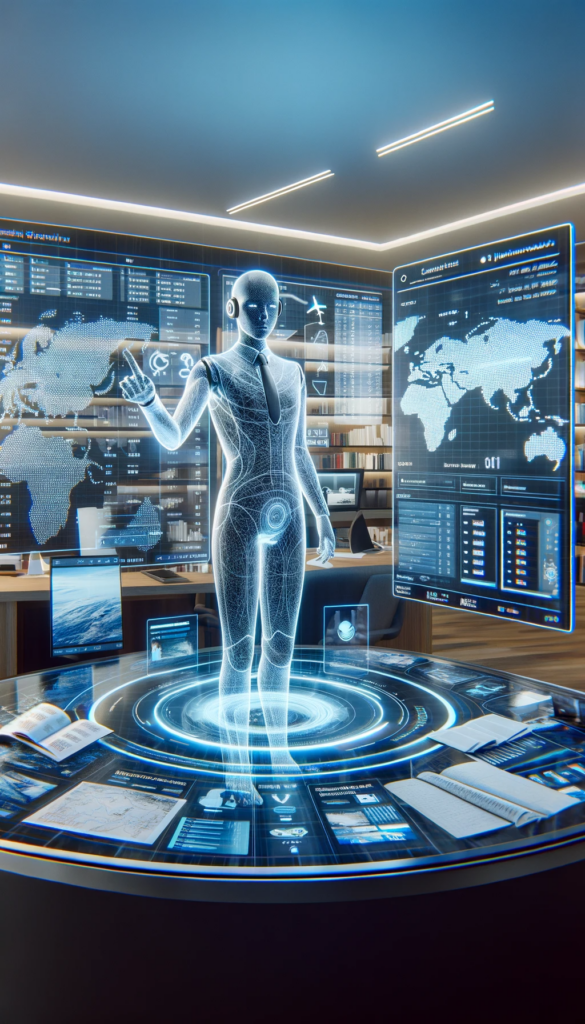
Author: Haolin Chen
The following week, personally, I felt like I had been through the “iPhone Moment“.
OpenAI DevDay launched the GPTs which is the “ChatGPT store” for me. Everyone no matter whether they know how to code or not, based on their knowledge, they can create their own ChatGPT.
There are companies like Humane, that published AI PIN, an AI-powered device trying to replace the smartphone, to become the newest concrete personal AI assistant device.
What is the future? The Agent Era
One Scenario for The Business Side:
Imagine that an experienced, top-tier lawyer can based on all the cases he or she has worked on in the past career years, combine millions of legal documents, not only replicate the depth of knowledge but also echo the empathy, personality, speaking way of delivering the message to build an “agent”.
This agent offers 24/7 personalized advice and ensures clients receive consistent, high-quality service. It bridges the gap between digital and in-person legal counsel, enhancing client-lawyer interactions with scalable, secure, and intelligent technology. This breakthrough could attract a mass of new clients to a law firm, revolutionizing accessibility to expert legal advice.
This is the future where legal expertise becomes universally accessible, where every question merits expert guidance, every case benefits from top-tier experience, and every client receives personalized attention—regardless of the hour or demand of human professionals.
Here, we need to mention that, the agent or more specifically that every conversation is supervised by the law firm which is the owner of the agent. Every legal advice is committed and responsible by the firm, which is essential in the law industry.
For the Individual side:
🤔 What is your personal agent should look like?
🤔 What is the interface between you and your personal agent?
🤔 How your personal database should be structured?
🤔 what is the way your personal agent interacts with other service-provided agents?
🤔 what is the boundary of the data exchange?
Let’s find out those answers one by one.
The personal agent will change the way you interact with the Internet and service provider.
The decision-making process today is often the outcome of endless browsing, reading reviews, and analyzing options. But with the personal agent, this process could be more accurate and customized based on the personal agent’s understanding of you.

For example, you have a 5-day vacation next month, and you want to travel to relax, but you have no idea where and what you want. Set up a travel goal for your personal agent, based on your trip history and consumption habits, your personal agent can provide serial complete trip plans with the estimated amount of money. After you view the details or change based on your preference, with a single click, everything is done for you. The flight ticket, the calendar agenda, the accommodation, even when you arrive, from the airport, the different ways to go to the city center, the recommendation of local special restaurants, if you are interested, automatically reservation at the restaurant.
Personally, the personal agent/assistant in my mind, shouldn’t only be a chatbot, the way of interaction can be text, natural language, UI interface, etc.
The most main point is the agents replace applications, so the underlying logic is your personal agents combine and access the data and algorithm from different providers.
How your personal database should be structured? Nowadays, you can download your data from Google, Apple, Amazon, etc. legally based on the law. But how to combine them together safely ethically efficiently is still a huge question. It seems that putting one more layer before the user accesses the Internet completely changes the landscape.
There are companies like Humane, that published AI PIN, an AI-powered device trying to replace the smartphone, to become the newest concrete personal AI assistant device. It is possible since it can continue collecting data and it is the first step is when you want to interact.
Talking about safety, ethics, and efficiency, we need a centralized data center to control the data exchange process set up the exchange boundary, and clarify the data exchange policy. To make sure, it is controlled monitored, and accessible by the individuals.
To be continued.
Other Articles:
